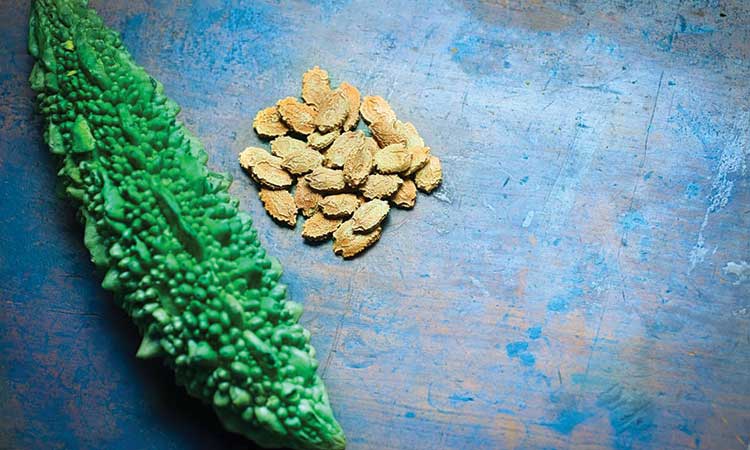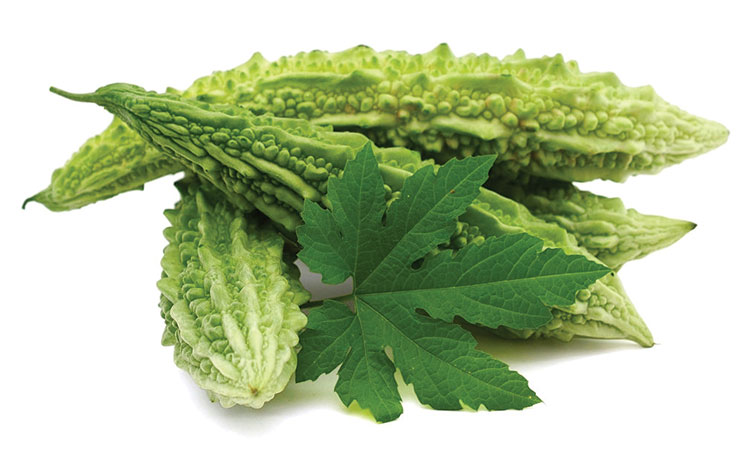During pregnancy, a woman has to make certain dietary and lifestyle changes. The pregnancy diet most likely comprises of all sorts of vegetables. However, even though nutritious, not all vegetables are safe to consume during pregnancy. Generally considered very healthy, let’s evaluate whether or not bitter gourd during pregnancy is safe.
Is It Safe To Eat Bitter Gourd During Pregnancy
The safety of bitter gourd during pregnancy is still a debatable topic. While many argue it is safe and beneficial during pregnancy, another group of researchers put forward the possibilities of some constituents in bitter gourd acting as a uterine stimulant.
One study states that even though bitter gourd is safe to consume during pregnancy, its’ seeds and roots can potentially stimulate the uterus. The same studies also state it’s not advisable to consume Karela or bitter gourd while trying to get pregnant.
However, so far, there is no evidence to link eating bitter gourd during pregnancy with gestational complications. Therefore, it can be concluded that there is no harm in the occasional consumption of bitter gourd during pregnancy. Moderation is the key. You can have up to one small cup of this vegetable maximum twice a week.
Nutritional Benefits Of Eating Bitter Gourd During Pregnancy
Bitter gourd is a rich source of vitamins like vitamin A and vitamin C. It also contains Vitamin B2, B3, and B1. It also holds a significant amount of minerals like iron, magnesium, and potassium.
Karela contains twice the calcium of spinach. It also contains double the amount of beta-carotene found in broccoli. It also contains minerals like thiamine and riboflavin. Bitter gourd is also rich in fiber.
Bitter gourd is also blessed with an insulin-like compound called charantin. This polypeptide help in reducing the blood sugar levels. It also contains antioxidants and anti-inflammatory compounds.
Amazing Health Benefits Of Bitter Gourd During Pregnancy

Bitter gourd, as the name implies, has an extremely bitter taste. However, it is loaded with minerals and vitamins that are excellent for our health. It has amazing medicinal properties and is used as a natural remedy for many health issues. So what are the potential benefits of eating bitter gourd during pregnancy? Let’s find out.
Calculate Due Date With LMP
1. Boosts immunity
Bitter gourd is rich in vitamin C. This vegetable also has a strong antioxidant property. Hence, eating bitter gourd during pregnancy helps to boost immunity. Karela also has antiviral property. So it might help to fight off common allergies like cough and cold.
2. Protects baby from neural tube defects
It is important to include folate-rich food in pregnancy diet. This is because folate protects the fetus from all kinds of neural tube anomalies. Bitter gourd has admirable amounts of folate. In fact, one bowl of bitter gourd meets around a quarter percentage of daily folate requirement.
3. Helps to relieve constipation
Karela is rich in dietary fiber. Therefore, it helps in relieving constipation. Haemorrhoids and constipation are two annoying issues many pregnant women face. Eating bitter gourd during pregnancy helps to fight off both these issues.
4. Helps to combat digestive tract disorders
Karela supports a healthy gut bacteria and thereby promotes digestion and nutrient absorption. Being rich in fiber, Karela helps with the bowel movement keeps the digestive tract clean.
5. Loaded with many necessary nutrients

Bitter gourd is stuffed with all the required nutrients that are crucial for the fetus’ growth and development. This vegetable contains an appreciable amount of niacin, magnesium, potassium, manganese, zinc, pyridoxine, and pantothenic acid.
All these elements are ideal for the proper development of the fetus. Thus, this could be considered as super veggie for consumption during the crucial period of pregnancy
6. Ideal for women with gestational diabetes
Anti-diabetic properties of bitter gourd make it ideal for mothers who are prone to gestational diabetes. Karela is rich in protein called polypeptide-P. This protein mimics insulin-like properties. Therefore, Karela is very beneficial to combat gestational diabetes.
Bitter gourds can potentially regulate metabolism, and utilization of the sugar absorbed by the body. Therefore, it helps to prevent sudden spikes and drops in insulin levels. Bitter gourd has hypoglycemic property as well. This helps in lowering the blood sugar level.
7. Helps to avoid unnecessary weight gain
Excess weight gain during pregnancy could invite several other issues that hinder the normal progression of pregnancy. As bitter gourd is rich in fiber, it makes you feel full and thus curbs the hunger pangs or food craving that cause excess weight gain.
Bitter gourd is low in calories. It is also low in fat and carbohydrates. Besides, bitter gourd contains 80-85% water. All these contribute to weight control.
Karela also stimulates bile secretion, thereby, accelerates the process of metabolizing fats into energy. This will helps to reduce fat deposits in the body.
Side Effects Of Bitter Gourd During Pregnancy
In spite of all the advantages explained, bitter gourd also carries some risk factors. We are not talking about consuming a small bowl of it two or three times a week. This kind of consumption will not trigger any of the side effects mentioned below.
Excessive consumption or having it every day can cause toxicity due to the alkaline components in it. Too much consumption of bitter gourd, thus, can bring about:
- Abdominal cramps
- Nausea
- Muscle weakness
- Diarrhoea
- Bloating
- Another important side effect of over consumption of bitter gourd is anaemia. Studies show that Vicine, one of the components found in bitter gourd, can potentially break down RBC, causing favism. This can lead to anaemia. However, only overconsumption of Karela can trigger this condition.
- In extreme cases, overconsumption of bitter gourd during pregnancy can cause uterine contractions and bleed. You cannot overlook the risks of miscarriage as well. Therefore, elderly people in the house used to insist on avoiding Karela during the first trimester.
- Towards the end of pregnancy, overconsumption of this vegetable may trigger preterm labour and delivery.
Therefore, irrespective of this vegetable’s health benefit, it is always wise to consult your gynaecologist before adding this into your diet. This is important if you are not used to eating this vegetable before.
Does Bitter Gourd Cause Miscarriage?

Excess consumption of bitter gourd, or having bitter gourd juice more often can induce uterine contraction and cause bleeding. This could lead to miscarriage. Uterine contraction is harmful at any stage of pregnancy before the due labour. Overconsumption of bitter gourd during pregnancy can also bring about premature labour.
Precautions When Eating Bitter Gourd During Pregnancy
It is important to look into some precautionary measures when you choose to eat bitter gourd during pregnancy:
- Completely avoid eating bitter gourd seed during pregnancy. Seeds of this vegetable can bring about anaemia, abdominal cramps and diarrhoea
- This vegetable’s excessive intake can cause a drastic drop in blood sugar level, which is not advisable during pregnancy
- If you take bitter gourd along with diabetic medication it can also adversely affect the optimum blood sugar level
- Suppose you have a scheduled C section. Stop eating bitter gourd two weeks prior to the surgery
Tips to make bitter gourd less bitter
- Carefully scrape off the rugged surface of the bitter gourd.
- Boil bitter gourd in salt water for a couple of minutes. While you drain out the water, most of the bitterness will also get removed along with it.
- Remove the seeds before cooking. This double the benefits as Karela seeds are not supposed to be consumed during pregnancy.
- Slice the bitter gourd and sprinkle salt over it or rub salt into each slice and keep it aside for 30 minutes before cooking. Salt extracts the bitter taste from the Karela slices. Before cooking wash the slices in water to get rid of salt.
- Soak sliced Karela in tamarind juice for 15 minutes
- Soak Karela in diluted curd for one hour and wash well before cooking
- You can balance out the bitter taste by adding some jaggery towards the end of cooking. ( One teaspoon of jaggery is enough for 500grams of bitter gourd)
- Sautéing in olive oil is another way to reduce the bitter taste.
- You can also neutralize the bitterness to some extend by cooking it along with potatoes, coconut, and onions.
- Take equal parts of vinegar and sugar and boil them to make a mixture. Soak the sliced Karela in this solution for 20 minutes.
Ways to incorporate Bitter Gourd in pregnancy diet?
- Deep-fried bitter gourds are both palatable, and this type of cooking will reduce the bitterness of the vegetable to great extend. This chip makes a healthy snack.
- You can make delicious stuffed parathas with Karela.
- You can prepare yummy sabzi out of bitter gourds and have it along with rice or chapati for lunch or dinner.
- You can make Karela curry. Add some coconut milk or yoghurt to add more flavour to the dish.
Conclusion
Bitter gourd during pregnancy is relatively safe if you have it moderately. Overconsumption should be avoided at any rate. Also never take it if you are under treatment for gestational diabetes.
If you are not used to eating bitter gourd prior to pregnancy, never start to eat it during pregnancy. We cannot foresee how your body reacts to a new food. You have to consult your doctor before incorporating anything new in pregnancy diet.

